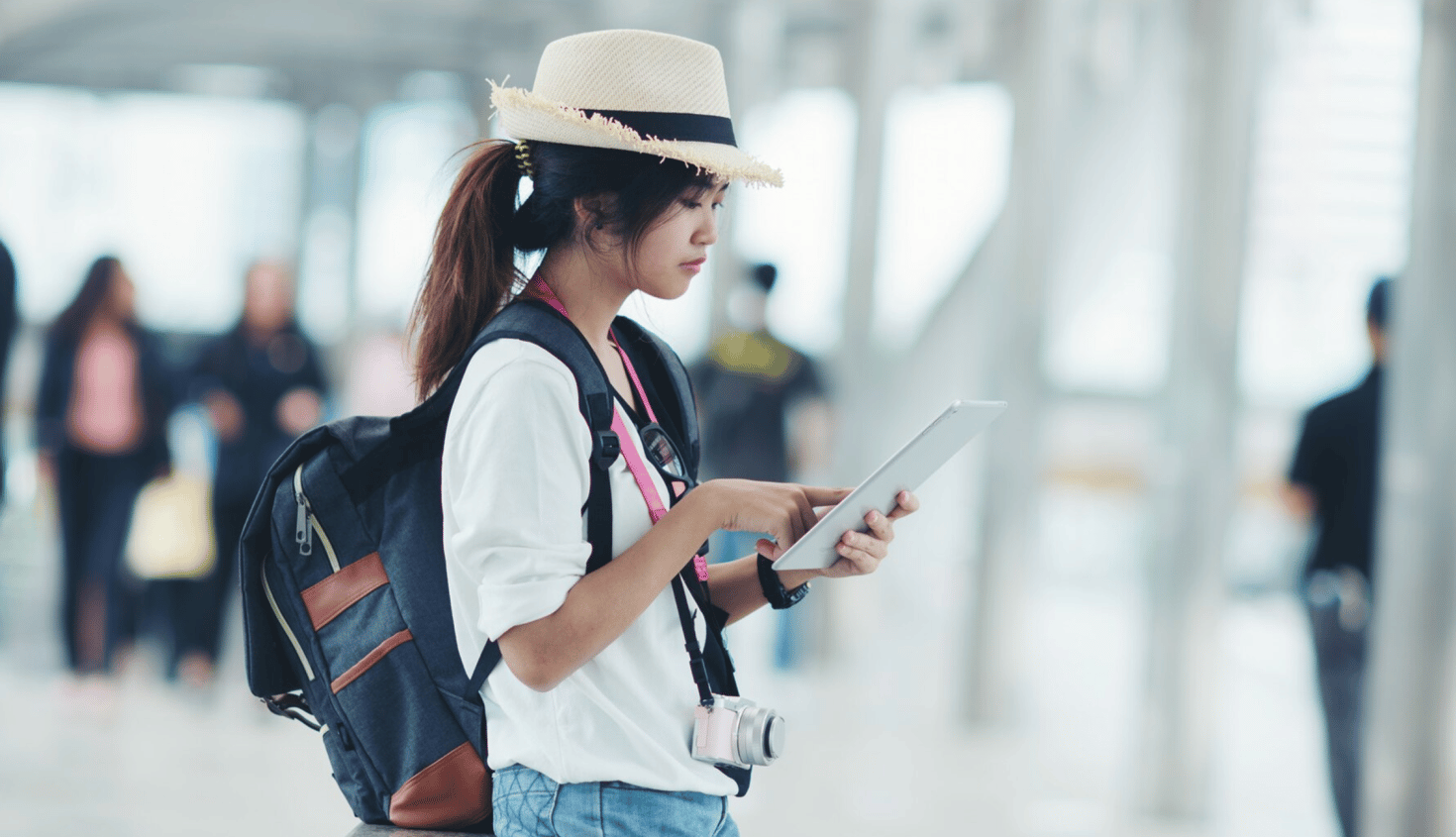How IoT Is Changing The Travel Industry Today and Tomorrow


Traveling is one of the leading industries to embrace technical innovations, IoT being among them. This game-changing technology is forming a new reality – cost-efficient, eco-friendly and customer-centered – a bit at a time. Companies invest in IoT solutions, and the tendency seems to be only picking up steam.
How often do you decide not to visit a desired but far-away location because of travel inconveniences? The agony of choosing, long and exhausting flights, no decent places to stay, bad experiences with a travel agency or flight operator, etc. The reasons are multiple. What if we told you IoT can solve lots of your traveling pains? Go ahead and plan your next adventure; the travel industry is changing before your very eyes!
General Technology Trends in Traveling
VR and AR
Applying what virtual and augmented reality can offer has been quite a challenge for the travel industry. At the moment, it uses the possibilities of VR and AR for marketing issues to draw new customers and provide a better experience. You can check out hotel rooms in advance or explore a ski resort before booking. You can travel to some exotic destination virtually and decide whether you want to see it with your own eyes. There are some interesting services for this, give them a try.
While virtual reality is awesome but not revolutionary for traveling, augmented reality can become a game-changing innovation. Combined with wearables, which is one more buzzing trend of traveling, it has more practical applications within the industry. AR mobile apps provide translation, navigation and guides to assist a tourist along his way from accommodation to exploring the attractions.
AI
As with any other industry, tourism takes from AI all it can offer at the moment. Machine learning, robotics and virtual assistants are the parts AI has brought into traveling. More personalized, automated and cost-efficient recommendations based on the tourist’s destination, likings and preferences, previous experience, etc. Quick and optimized baggage handling with the help of robots is another issue AI is dealing with at the moment, at least in Dubai.
Chatbots and virtual assistants are one more useful implementation of AI for both travel businesses and tourists. Why not take a personal companion on a trip with you? It not only helps you to optimize the route and avoid difficulties along the road but also makes your trip memorable by offering the best activities with a personal touch.
IoT
Internet of Things gathers all the mentioned trends in the general pile of innovations, together with wearables, Wi-Fi connectivity and voice technology, to create a new and better reality of connected devices. Could you believe the network of devices can make your traveling pleasant and stress-free? Here’s how.
How Traveling Embraces IoT
Internet of Things has entered almost all industries and is shaping new rules for competitiveness. If you are not there yet, hurry up: Ericsson estimates in 2018, the number of connected devices will exceed mobile devices. The travel industry leverages IoT in various spheres to increase competitiveness and customer satisfaction.
Before the Trip Starts
Visiting a travel agent personally becomes a relic of the past. With everything moving online, you can make all the preparations from choosing a destination to booking flights and hotels from your couch. More than that, your travel agent already knows your preferences based on your previous trips, social media info, feedback, shopping list, and so on. The data gathered and analyzed through connected devices helps the travel agency (or similar) find a perfect match for you in terms of cost, flight convenience, hotel suggestions, etc.
Borderland Between Technology and Human Interaction
Utilizing IoT, travel agencies leverage innovations while keeping personal contact with customers. Mobile apps help to create a cross-platform relationship with travelers allowing the company to assist the customers along the way. At the same time, it is gathering associated info about their behavior. Customer satisfaction and efficient marketing strategy rise as a result of such cooperation.
No Stress on Board
Finding your path within an airport is no problem. Notifications about your flight status, directions to the gates, luggage carousels, lounges or the nearest cup of coffee – everything’s in your smartphone. Forget about lost baggage; re-usable electronic bag tags instead of paper ones allow you to track your belongings from any device.
The in-flight experience drastically improves as well. With sensors embedded in the passengers’ seats, the crew can comfort a person whose heart rate has jumped too high or who is feeling thirsty. Body temperature, hydration level and anxiety level can be monitored and taken care of.
Make Yourself at Home
IoT-empowered hotel apps provide customized settings for every guest. Room temperature, light, heating, and TV can be set and controlled remotely. You can unlock your room with the electronic key on your smartphone and allow access to only certain people. You can request additional towels and order food while having a bath in your room. Hotel maintenance becomes easier as well. Due to the sensors, the staff can define whether the room is empty or occupied at the moment, is there any need for the new towels or should the housekeeping come and take away a food tray.
At the top, the information gathered by the connected devices helps hoteliers to provide the highest level of personalization. Before you check in, the staff can organize a gluten-free drink for you, tune a TV to your favorite news channel and leave a yoga carpet near the open window in the bedroom. This is how brand loyalty is built by means of IoT.
Adventures Without Unpleasant Casualties
Managing tourist attractions and transportation systems while the number of tourists grows is a major struggle for popular touristic locations. IoT is irreplaceable here: crowd management, smart navigation, the latest information on various places of interest, upcoming events, and many more functions become essential for every big city.
With the help of connected devices, you are able to find the nearest bus stop or free parking lot, optimize your route according to your preferences and locate your favorite clothing brand in a city your visit for the first time. Broad adoption of the Internet of Things in different spheres of city life leads us to a more global concept of Smart City. Here, the AI and robotics, IoT and wearables, connected and autonomous vehicles work together in a single unit to provide the optimized, eco-friendly and a less stressful environment.
Conclusion
If you think the real implementation of IoT in everyday travel routine is light years away, think twice. It’s already here, and industry representatives as Lufthansa, Hilton, Marriott, and Dubai, Miami and Helsinki airports benefit from it. They partner with technology giants like Intel, Motorola, Samsung, Microsoft, and others. Their goal is to optimize interaction with travel companies, improve airport and onboard experiences, build brand loyalty, solve transportation and crowd management issues. It seems the spirit of adventure is becoming a bit more palpable, don’t you think?
READ ALSO
 September 29, 2025
September 29, 2025
Build your team or extend with ours? Here’s what helps fintech CTOs decide
Read the post September 10, 2025
September 10, 2025
Fixed-price projects vs dedicated teams: A fintech CTO comparison
Read the post September 3, 2025
September 3, 2025
How burnout is crippling tech leadership in the Nordics and Benelux
Read the post September 29, 2025
September 29, 2025
Build your team or extend with ours? Here’s what helps fintech CTOs decide
Read the post September 10, 2025
September 10, 2025
Fixed-price projects vs dedicated teams: A fintech CTO comparison
Read the post September 3, 2025
September 3, 2025
How burnout is crippling tech leadership in the Nordics and Benelux
Read the postWrite your own
success story
with Pwrteams!
Share your details in the form, tell us about your needs, and we'll get back with the next steps.
- Build a stable team with a 95.7% retention rate.
- Boost project agility and scalability with quality intact.
- Forget lock-ins, exit fees, or volume commitments.